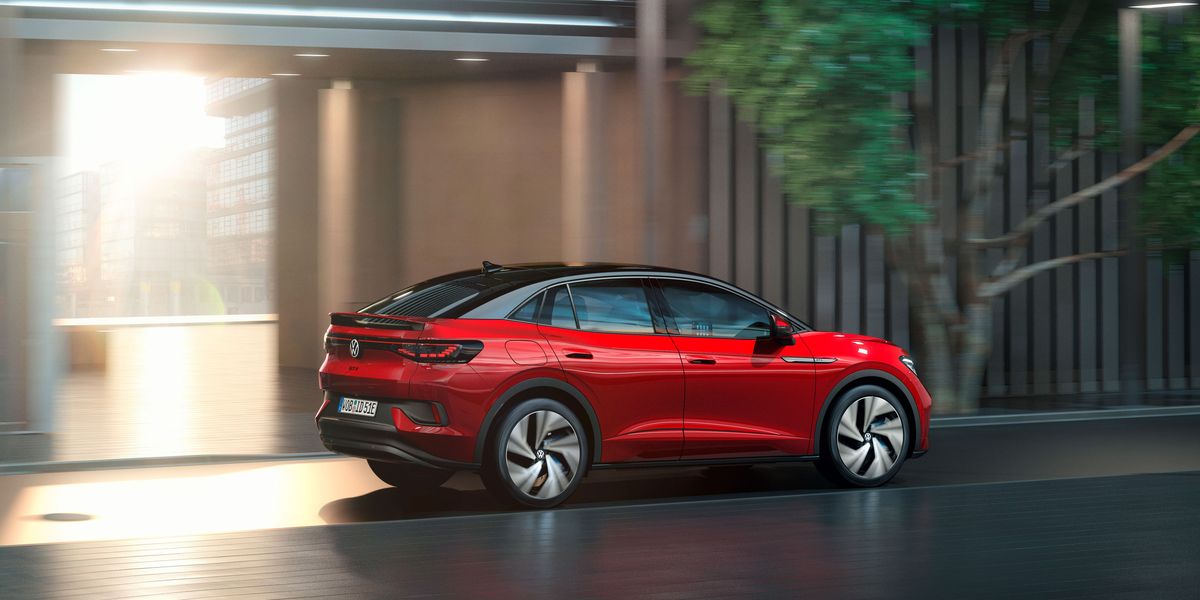2023 Volkswagen ID.5 GTX Attempts to Take the ID.4 up a Level

The diesel-emissions scandal is fading from public consciousness, but the repercussions are far from over. The chief one for Volkswagen is a big push into EVs, and the models on its MEB platform are a key part of this strategy. In the U.S., the ID.4 crossover is VW’s most important EV offering, and now in Europe, VW has added a sporty variant called the ID.5. Volkswagen’s EV “coupe” follows similar offerings from its corporate siblings, the Audi Q4 e-tron Sportback and the Skoda Enyaq Coupé, which ride on the same platform.
When you buy a coupe, you might deal with slightly diminished practicality but expect a payoff of visual excitement. Unfortunately, here the ID.5 falls flat on its dull face—which, in fact, is unchanged from the ID.4. The ID.5’s roofline is somewhat lower and more sloped, but since the ID.4 looks somewhat coupelike itself, the ID.5 design doesn’t mark a major change when viewed in profile either. The taillights are identical too. Only the liftgate looks truly different thanks to a prominent spoiler.
Inside, the ID.5’s dashboard is lifted straight from the ID.4. The infotainment system has a 12-inch display and could be more intuitive. A touch slider controls volume, and some important functions—such as turning off the irksome lane-keeping assistant—are hidden in submenus. The electronic gear selector requires you to push away (or forward) for Drive instead of pulling back, which takes some getting used to. (We’re told the setup, which is the opposite of a conventional automatic transmission, was the subject of intense internal debate at VW.)
But there are many good ideas in this car too. A plug-and-charge function does away with the need for a separate RFID tag, app, or charging card—the billing runs via VW’s own We Charge. In Europe, Volkswagen’s system is recognized by many major charging networks such as Ionity, Aral, BP, E.ON, and Enel, as well as Iberdrola and Eviny, with more to come.
On the road, the ID.5’s Travel Assist adaptive cruise control keeps the car centered in its lane, adjusts to speed limits or bends, and maintains a safe distance from the vehicle ahead. Parking can be automated too: In addition to the usual automatic steering, accelerating, and braking when pulling into or leaving a parking space, the ID.5 can remember a path of up to around 50 yards below 25 mph, such as pulling into a narrow driveway or a tight garage. Once you have parked yourself and stored the process, the vehicle can repeat the parking maneuver it has learned, while the driver only has to monitor the proceedings.
The 77.0-kWh battery can now be charged with 135 kW, up from 125 kW. For a standard charge from 5 to 80 percent, this should save up to nine minutes. And the e-route planner, which offers multistop planning via the 12-inch touchscreen, has become smarter and full of clever details. For example, the route planning can suggest two short faster charges instead of one long lower-power charge.
As on the ID.4, rear-wheel drive is standard on the ID.5. The GTX model we drove comes with all-wheel drive. It is fitted with an asynchronous motor at the front axle and a synchronous motor at the rear. With 295 horsepower (same as in the all-wheel-drive ID.4), the powertrain provides quick response despite the ID.5’s considerable heft. The GTX gets to 62 mph in a claimed 6.3 seconds, and unlike the rear-wheel-drive model, it doesn’t let up until reaching its top speed, governed at a modest 112 mph. The brake regeneration is adjustable—to an extent. In the Sport setting, turning it off is impossible, which is a shame, as some drivers prefer their EVs to coast when the accelerator is lifted.
Handling is pleasantly agile, and the software has been fine-tuned to whisk this portly EV around corners with astonishing agility. There is considerable body roll, but understeer has been virtually eliminated. The emphasis is still on comfort, though, and those who hope that the GTX moniker could indicate an analogy to the gasoline-powered GTI models will be in for disappointment.
One thing we particularly like about the GTX version is the blue vinyl decor accentuated by red stitching on the doors and dashboard. The color and trim provide a pretty and saving element in an otherwise generic and uninspired interior.
The ID.5 GTX is currently the VW brand’s ultimate expression of this platform, and it doesn’t come cheap. Has VW cut too many corners in creating meaningful differentiation from the ID.4? We think so, and evidently, Volkswagen of America agrees. We’re told the ID.5 won’t be offered in the U.S. market.
A car-lover’s community for ultimate access & unrivaled experiences. JOIN NOW
This content is created and maintained by a third party, and imported onto this page to help users provide their email addresses. You may be able to find more information about this and similar content at piano.io



